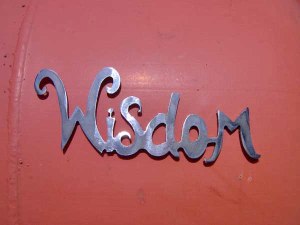“Wisdom consists of the anticipation of consequences” – Norman Cousins
Four months away from having a Bachelor of Arts in English Language and Literature conferred upon me by a reputable institution of higher learning, I ponder the definition of wisdom.
Many of the quotations I found while searching for something that partnered well with my post inferred that wisdom was directly related to asking questions. I really thought that would be knowledge, so I went to the dictionary for a clear definition.
Dictionary.com says that wisdom is “knowledge of what is true or right coupled with just judgment as to action; sagacity, discernment, or insight.” In my own words, I’d say wisdom means knowing the right thing to do and doing it. Additionally, I believe wisdom understands there is a “best way” for these actions to be completed and performs them accordingly.
Several days ago, I posted on my church blog about a wise woman from the Bible named Abigail. Her life, filled with unpleasantness at the hands of her churl of a husband, wouldn’t seem one that would lend itself to finding wisdom. However, that wasn’t the case at all.
Some Americans in this era act as if higher education is the path to wisdom. If you don’t have a college degree, you’re doomed to mediocrity and probably believe everything you hear on TV.
Education is the path to knowledge. Wisdom is the path of experience. After eight weeks of reading Shakespeare, I can safely say I’m not an expert in anything having to do with The Bard. In fact, by increasing my knowledge and experiencing more of his writing first hand, my ignorance was illuminated. However, the path to wisdom isn’t by thorough knowledge of Shakespeare.
Wisdom graces our everyday life with enlightened decision making. Exercising problem solving skills and higher reasoning, anyone can live wisely. The key is to think before you act (or speak) and recognize when you don’t have enough information to accurately judge what the best course of action would be.
In that moment, a wise person asks questions. They seek knowledge to inform their decisions. So, I suppose all those quotes that saw a correlation between wisdom and asking questions were insightful, after all.
Wisdom: no college degree required. In fact, a college degree might give some people a false sense of confidence.
I hope and pray I’ll be wiser in four months. I’ll be exercising decision-making skills every day until then. In the meantime, I’ll remember that “Even a fool, when he holdeth his peace, is counted wise: and he that shutteth his lips is esteemed a man of understanding” (Proverbs 17:28).
I hope I’m wise enough to keep my mouth shut.

